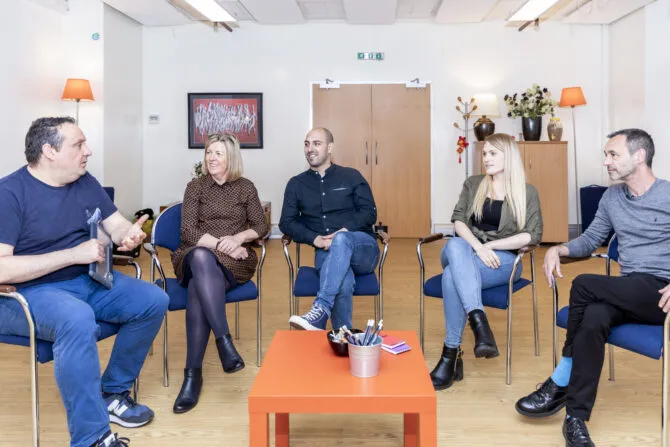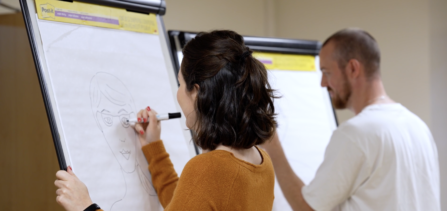Building Resilience Course
On our building resilience course you will look at where you already feel resilient and the circumstances that can undermine your resilience.
- Maximum 8 Delegates
- Top Quality Trainers
- Money Back Guarantee
Useful strategies & techniques presented in an engaging & relatable manner. The instructors were very knowledgeable and kept everyone involved through physical activities and group work. There is a fantastic level of support following the completion of the course, with resources available through a website and emails from the instructors.
This course helps you with
Understanding Resilience
Recognising Undermining and Supporting Factors of Resilience
Identifying Strengths
Changing Default Behaviours
Determining What Happens Under Pressure
Building Confidence

Book this Building Resilience Course
This course is only available as one-to-one skills training.
Please contact us to discuss further options.
If you want to book 4 or more people on to a single course, please contact us:
Location
London Training Rooms,Suite 121
Business Design Centre,
52 Upper Street,
London, N1 0QH
Running time
{{courses[0].StartTime | formatTime}} - {{courses[0].EndTime | formatTime}}
Course Overview
On our building resilience course, you will look at where you already feel resilient and the circumstances that can undermine your resilience.
We will look at patterns, default behaviours, emotional reactions, and expectations.
There will be practical, doable tools and techniques that will help you to build your resilience.

Course Benefits
This Building Resilience Course is limited to 8 delegates ensuring personal attention to everyone on the course.
Top-quality trainers means a total focus on you.

Building Resilience Course
ONE DAY:
Build awareness of what resilience is and what can build and break it
- The Ladder to Nowhere
- What is Resilience?
- Buffer to Stress
- Personal Resilience
- Resilience Cycle
- What Builds Resilience?
- What Else Contributes?
- What Breaks Resilience?
- The Undermining Voice
- Tipping Point
- Behaviour Change
- Purpose
- Values
- Context
- Circles of Concern
- Confidence
- Getting Unstuck
- Supportive Environment
Podcast
Listen to Impact Factory Director Jo Ellen Grzyb and Senior Training Consultant Paul Hughes talking about Building Resilience
Course content
Ladder to Nowhere
How thoughts can escalate a difficult situation into a catastrophe
What is Resilience?
Defining ‘resilience’
Discussing behaviours and emotions
How Resilience is developed
Stress Buffers
Good and Bad Stress
Tipping Points
Building in Time Outs for recovery
Resilience Cycle
Something Happens! → First Reactions (instinctive brain usually kicks in here) →
Thought Gathering → Second Reactions → Stepping Away and Gaining
Perspective → Getting Support → Solution Finding
What Builds Resilience?
Emotional Control
Making Meaning
Realistic Positivity
Elasticity
Support
- Solution Finding
- Self-Belief
What Else?
Humour
Acceptance
Seeing the bigger picture
Gaining perspective
Creating a support network
Knowing how to self-care
What Breaks Resilience?
What undermines resilience
- Overload
- Your own mistakes
- Someone else’s mistakes
- Unanticipated bad news
- Difficult managers, colleagues, etc.
- Unresolved conflict
- Sustained criticism
- Emotional or physical shocks
- When things don’t go to plan
Undermining Voice
Identify your undermining voice
Determine how to combat it
Tipping Point
How you respond to difficulties
Behaviour Change
Your default emotional response
Your ‘narrative’ that helps or undermines resilience
Values
Identify and acknowledge personal values
Context
How resilience and purpose change in different contexts
Circles of Concern
You will identify
- What you are concerned about
- Where you have influence
- What you can control
Getting Unstuck
Identifying underlying issues
How to move problems forward
Confidence
Participants build a resilience pyramid
- Recognised strengths and traits
- Acquired and developed skills
- Behaviour that reflects those strengths
- Strapline to articulate your resilience
Supportive Environment
Your support structure
- What do you already do?
- What are your calming strategies?
- Where do you off-load?
- Does it work?
- What else do you need?
Our Course Team
Reviews
Highly recommend. This was a fantastic course and I came away feeling so much more knowledgeable about this topic.
It was a special day – Excellent trainers, friendly approach and the content was tailored to suit the needs of the delegates on the day which made it very meaningful. THE BEST training course I’ve EVER attended!
Useful strategies & techniques presented in an engaging & relatable manner. The instructors were very knowledgeable and kept everyone involved through physical activities and group work. There is a fantastic level of support following the completion of the course, with resources available through a website and emails from the instructors.
CPD Accredited Course
A total of 6 (SIX) hours CPD study will be completed for this course.
Ongoing Support Service
- Email and telephone access to both of your trainers.
- You will also have access to the Building Resilience post-course web page, giving access to the extensive material and imagery including:
Why Choose Impact Factory?
We provide a learning platform that is tailored to your professional growth, no matter your level of experience. Your training course will cover the topics in a fun and engaging way, delivering high-level concepts in a fresh, engaging way that is accessible to everyone.
Some of the reasons we believe in our ability to deliver you success:
- 5 Star rating on Google, from professionals just like you.
- 4.8/5 For Customer Experience and 4.9/5 For Our Product On Feefo, from verified individuals.
- A diverse delivery team, each bringing a unique delivery method.
- Frequently sold-out workshop sessions.
- A wealth of case studies.
- CPD Accredited Course
- A track record of delivering value for organisations through the empowerment of their people.






















